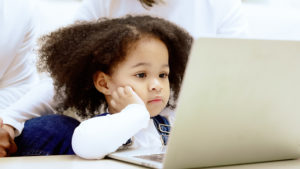
A few years ago, I was teaching a course on therapeutic techniques used with children and teen clients. We were becoming aware of the marked increase in anxiety, depression and suicidality in kids, which led to discussions on contributing factors. The emerging literature showed a correlation between these negative symptoms and device use, specifically with regard to social media and online interactions.
Additionally, personally, one of the more intimidating areas of parenting was (and continues to be) the uncharted territory of guiding children in their digital lives. I had already chosen a school for my daughter which emphasized non-tech learning approaches (to slow down the digital exposure) but I also felt overwhelmed by the future… what would I do when my daughter was older and would inevitably have to navigate the internet at some point? How could I best prepare her to be resilient to the physical and emotional threats posed in online spaces?
I went to a therapy conference and one of the presenters was asked about the mental health consequences as children spend more and more time online. The speaker said… “The internet was initially intended for adults to share information.” Well, we know now, the internet has evolved from a digital library to a global “town square” – it is where we connect with others and express our thoughts and feelings.
Daniel Siegel’s books such as The Whole Brain Child and Brainstorm help us understand the challenges of decision making and coping with big feelings when a child doesn’t have the skillset of a fully developed brain. Children experience much of their brain development after they are born (which is different from other animals). This makes kids more dependent on their parents overall for longer periods of time. Parents and other trusted adults help fill in the gaps where kids are still lacking. So, what is it about kids and teens that make them poor candidates for the internet? Well, their brains are still in the process of development and they do not yet have the skills needed to navigate the complexity of online spaces. Just as we would hold our child’s hand as they learn how to cross a busy street, we can metaphorically hold our child’s hand as they encounter tricky online exchanges.
My colleague, Adam Dodge, and I collaborated to create The Tech Savvy Parent in an effort to educate parents on ways they can expand the parenting skills they are already using to include situations children may encounter digitally or in online spaces. Kids’ lives have gone digital but parenting hasn’t. Most parents today did not grow up with the internet so there is no reference point for parenting within the context of current technology. We are trying to address both the overwhelming feeling parents have in tackling this divide, while also addressing the youth mental health crisis we are now facing. Our goal is to help parents prepare their children for digital life while bringing ease to an overwhelming topic.
